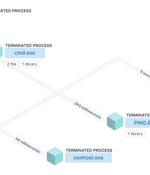Security News

TechRepublic Premium Bring your own device policy PURPOSE The purpose of this Bring your own device policy from TechRepublic Premium is to provide requirements for BYOD usage and establish the steps that both users and the IT department should follow to initialize, support and remove devices from company access. These requirements must be followed as documented in order to protect company systems .....

A U.S. national has pleaded guilty in a Missouri court to operating a darknet carding site and selling financial information belonging to tens of thousands of victims in the country. Michael D. Mihalo, aka Dale Michael Mihalo Jr. and ggmccloud1, has been accused of setting up a carding site called Skynet Market that specialized in the trafficking of credit and debit card data.

In yet another instance of how threat actors are abusing Google Ads to serve malware, a threat actor has been observed leveraging the technique to deliver a new Windows-based financial trojan and information stealer called LOBSHOT. "LOBSHOT continues to collect victims while staying under the radar," Elastic Security Labs researcher Daniel Stepanic said in an analysis published last week. The American-Dutch company attributed the malware strain to a threat actor known as TA505 based on infrastructure historically connected to the group.

Resecurity has recently identified the STYX Innovation Marketplace, a new cybercriminal e-commerce platform with a specialized focus on financial fraud and money laundering. This platform is specifically designed to facilitate financial crime, providing cybercriminals with a range of services, including stolen financial data, credit card information, forged documents, money laundering services, victim reconnaissance 'lookups', and more.

The impact of identity fraud varies for organizations in the financial services industry, based on whether they belong to the banking or FinTech sector, according to Regula. When asked to evaluate the cost of the identity fraud they had experienced, the banking sector was found to be the most severely impacted, with a median financial burden of over $310,000.

A new dark web marketplace called STYX launched earlier this year and appears to be on its way to becoming a thriving hub for buying and selling illegal services or stolen data. However analysts at threat intelligence company Resecurity noticed mentions of STYX on the dark web since early 2022, when the founders were still building the escrow module.

Nexus malware is an Android banking trojan promoted via a malware-as-a-service model. In an underground cybercrime forum ad, the malware project is described as "Very new" and "Under continuous development." More messages from the Nexus author in one forum thread indicate the malware code has been created from scratch.

Australian loan giant Latitude Financial Services is warning customers that its data breach is much more significant than initially stated, taking the number of affected individuals from 328,000 to 14 million. Australian loan giant Latitude Financial Services has released an updated data breach notification warning customers that the breach is much more significant than initially stated, taking the number of affected individuals from 328,000 to 14 million.

An emerging Android banking trojan dubbed Nexus has already been adopted by several threat actors to target 450 financial applications and conduct fraud. "Nexus provides all the main features to perform ATO attacks against banking portals and cryptocurrency services, such as credentials stealing and SMS interception."

An Android voice phishing malware campaign known as FakeCalls has reared its head once again to target South Korean users under the guise of over 20 popular financial apps. FakeCalls was previously documented by Kaspersky in April 2022, describing the malware's capabilities to imitate phone conversations with a bank customer support agent.